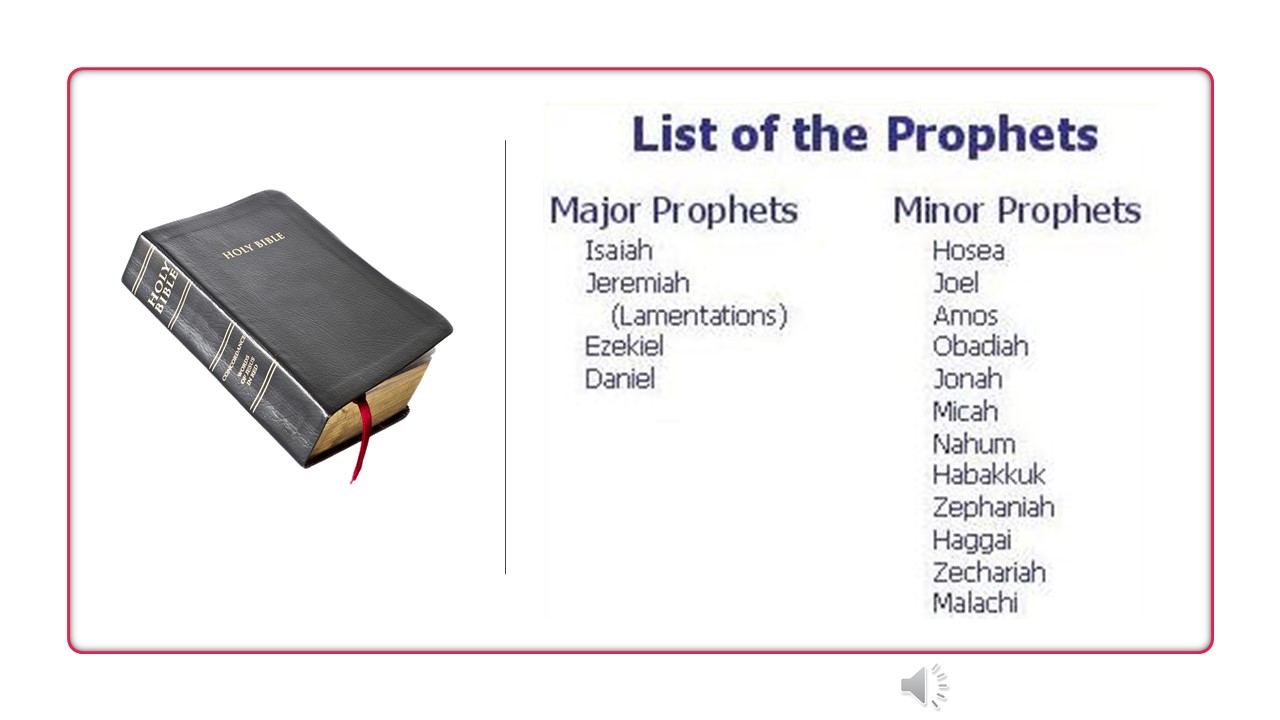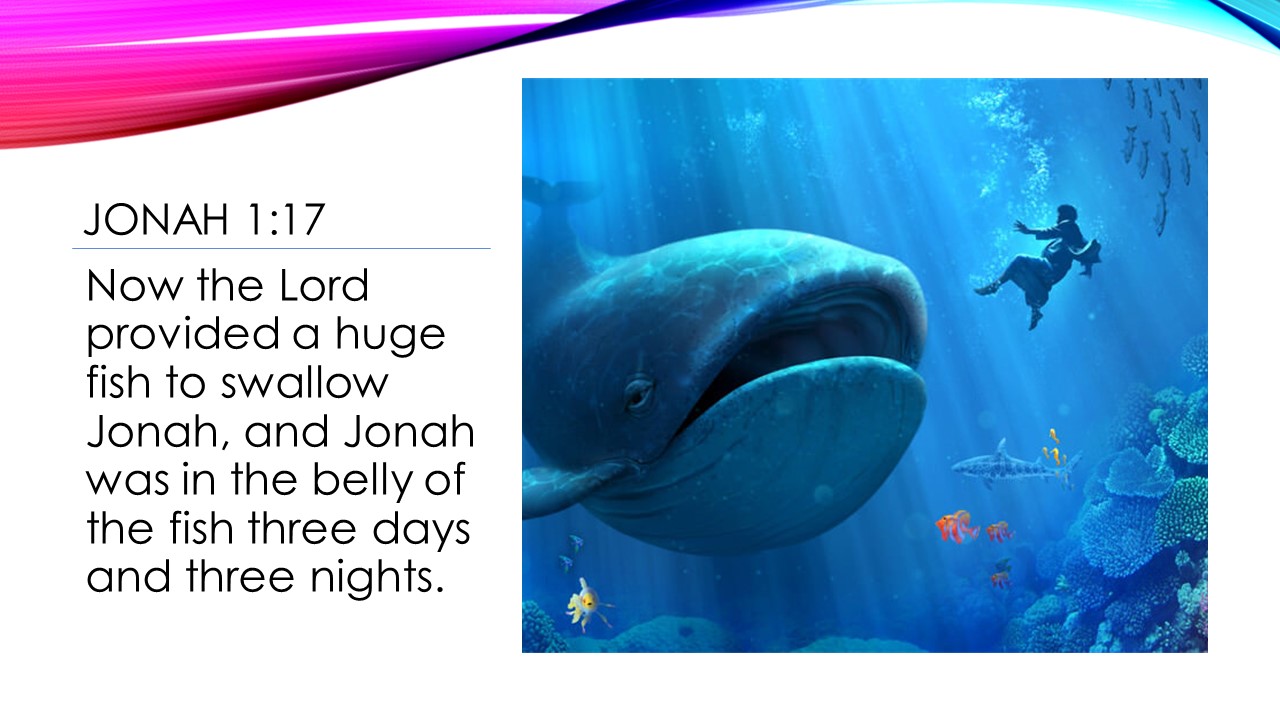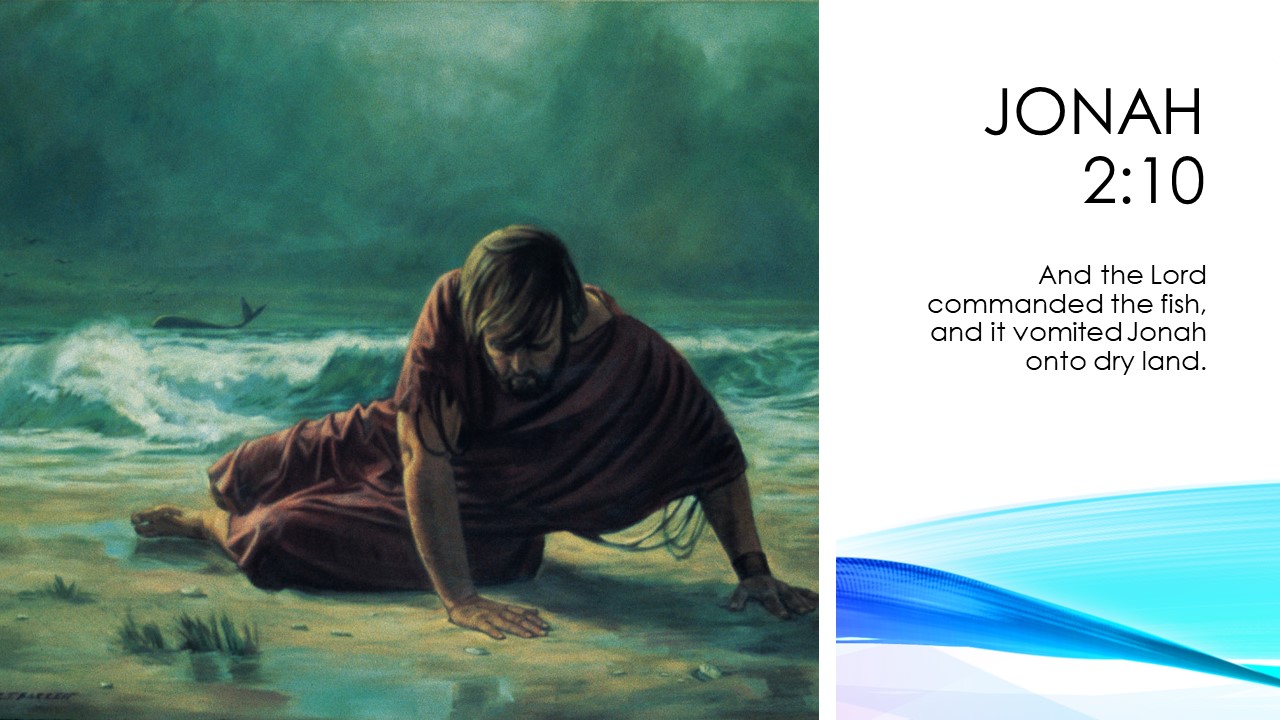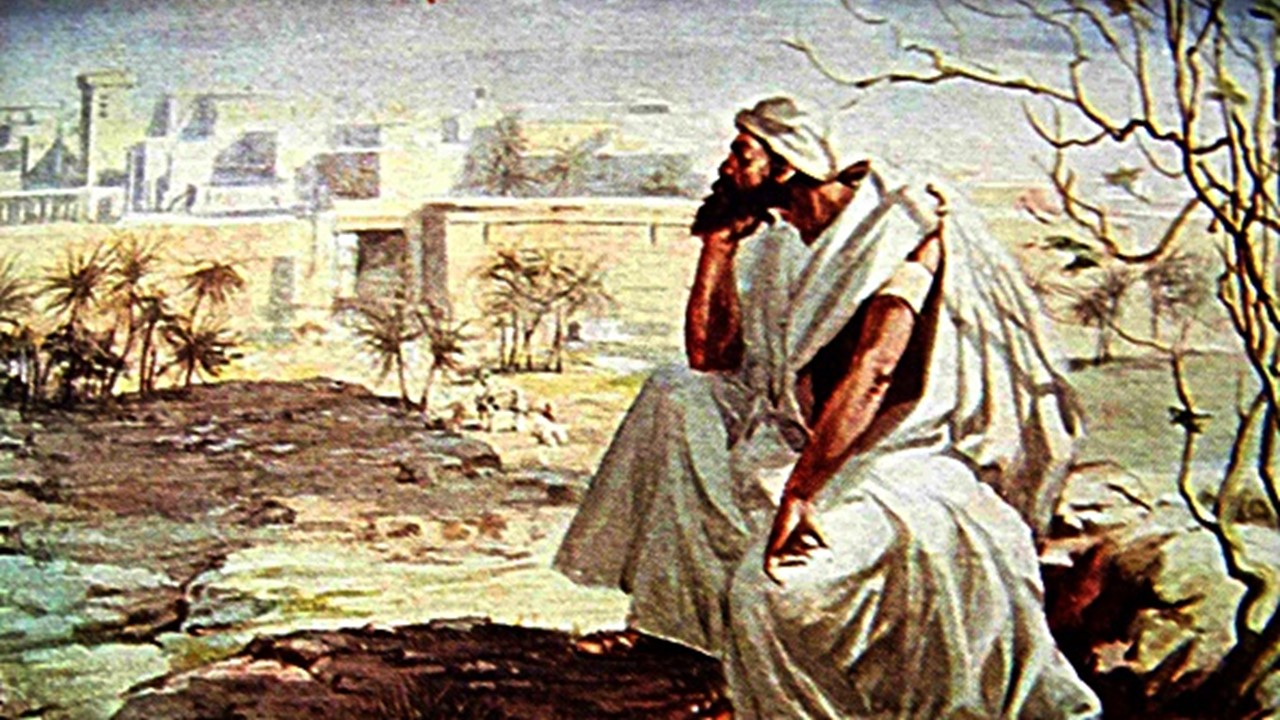I. Introduction
The Book of Jonah is one of the most famous bible stories. Children learn it, atheists scoff at it. The basic story is well-known – Jonah is on a ship, gets tossed overboard, then he is swallowed by a whale where Jonah lives for 3 days, then the whale spits him out. Lots of lessons can be learned from the book of Jonah, including obedience… and fishing, but after spending the week studying the book of Jonah, I came away with a different lesson I’d like to share with you.
But first, we’re going to correct whatever misconceptions you may have about Jonah and the Whale because we’re not going to study the children’s fairy tale, we’re going to study scripture.
II. Jonah
Jonah is the fifth minor prophet in our bible and the book is almost completely a narrative, a story. Jonah lived after Elijah and Elisha and we are first introduced to him in 2 Kings 14:25. King Jeraboam did evil in the eyes of the Lord, and Jonah was his prophet.
 Then we get to the book of Jonah that’s unique because, even though Jonah was a prophet, there are no prophecies in the book of Jonah. Just a story. But an important story, because Lord Jesus affirms that Jonah was a prophet and spent 3 days in the belly of a great fish.
Then we get to the book of Jonah that’s unique because, even though Jonah was a prophet, there are no prophecies in the book of Jonah. Just a story. But an important story, because Lord Jesus affirms that Jonah was a prophet and spent 3 days in the belly of a great fish.
And then…
III. Jonah 1 – Running from God
Jonah 1:1-3,
The word of the Lord came to Jonah son of Amittai: “Go to the great city of Nineveh and preach against it, because its wickedness has come up before me.”
But Jonah ran away from the Lord and headed for Tarshish. He went down to Joppa, where he found a ship bound for that port. After paying the fare, he went aboard and sailed for Tarshish to flee from the Lord.
In Jonah chapter 1, Jonah attempts to flee from the Lord. I thought it odd that he’s physically fleeing from the Lord, as though Jehovah is only the God of Israel and not the rest of the world.
Jonah is comfortably at home when God speaks in his hometown of Gath Hepher in the region of Galilee. The LORD speaks to Jonah abruptly – the book opens with the Hebrew word for “Now” even though many translations omit it. God wants Jonah to go 550 miles to Nineveh preach “against” some of the most vicious people on earth. How vicious?
There are historical records from the kings of Nineveh that kings boasted of their atrocities – I pulled up an ancient stone relief from the British museum showing two Ninevite soldiers erecting a stake with an impaled, naked man on it. And here’s some translations from Ninevite records from the University of Massachusetts at Lowell, and I’m not even going to read the worst –
“I flayed as many nobles as had rebelled against me and draped their skins over the pile of corpses; some I spread out within the pile, some I erected on stakes upon the pile … I captured soldiers alive erected them on stakes before their cities. … I flayed many right through my land and draped their skins over the walls.” … I cut off the heads of their fighters and built with them a tower before their city. I burnt their adolescent boys and girls.”

So Nineveh was beyond nasty. It was evil. And Jonah wasn’t being asked just to go down to Nineveh and start a ministry, the Lord told Jonah to preach “against” them.

Jonah immediately arose as the Lord commanded, but that’s about as far as his obedience went. Jonah went to the nearby town of Joppa and found a ship headed 2500 miles in the opposite direction. Jonah purchased his ticket and sailed away from the Lord’s direction.
I’m not exactly sure what Jonah was thinking here, running away from God. Certainly he was scared, but maybe he thought God lived in Israel and he could sail away. But maybe you and I have the same thoughts sometime, that maybe God won’t notice our sin. Maybe we can hide it. Maybe we can run away from it. Maybe God only sees us when we’re outside of our house or apartment. Let’s see in verses 4-6 how that worked out for Jonah –
Then the Lord sent a great wind on the sea, and such a violent storm arose that the ship threatened to break up. All the sailors were afraid and each cried out to his own god. And they threw the cargo into the sea to lighten the ship.
But Jonah had gone below deck, where he lay down and fell into a deep sleep. The captain went to him and said, “How can you sleep? Get up and call on your god! Maybe he will take notice of us so that we will not perish.”
But God’s power is not limited to Israel’s borders. God sends Hurricane Harvey directly at the ship, terrifying the sailors. The sailors start dumping cargo to make the ship lighter and they start praying to *other* gods.
Talk about a witnessing opportunity here. A prophet on the ship full of sailors that are looking for God. But Jonah is sleeping, oblivious to the tragedy going on around him. And I cannot help but draw a parallel – we live in a world that is being torn apart by cultural storm and we, the adopted children of God, have a perfect opportunity to share the message of God’s love, but instead, so many of us are asleep while those around us are perishing.
I know my own actions this month are not enough. All month long I’ve been seeing “gay pride” advertisements, as if either sexual deviancy or lack of humility was something to be proud of. And every time I see a product that sports that deviant rainbow in blatant disregard for God’s promises from Noah, I cross another product or company off my list of places I’ll do business with. But it’s not nearly enough.
Jonah 1:7-9,
Then the sailors said to each other, “Come, let us cast lots to find out who is responsible for this calamity.” They cast lots and the lot fell on Jonah. So they asked him, “Tell us, who is responsible for making all this trouble for us? What kind of work do you do? Where do you come from? What is your country? From what people are you?”
He answered, “I am a Hebrew and I worship the Lord, the God of heaven, who made the sea and the dry land.”
So the sailors have prayed to every god they know of, and Jonah just stands there silent. The sailors are like, “Who is responsible for all this calamity?” And Jonah just stands there. The sailors are like, “Let’s throw lots to find out who is responsible!” And Jonah just stands there. Then they all cast their lots, and it points to Jonah. And Jonah is like, “,,,, [pause] … Ok, it was me.”
The sailors discover that the LORD is not just a local god or the god of the sea or even just the God of Israel, but the God. The God who made the sea. Their fear is real; even today, many peoples of the world hold the idea that all misfortune comes from some offense to some god. Jonah tells them the truth and tells them about Jehovah God.
Verse 10-12,
This terrified them and they asked, “What have you done?” (They knew he was running away from the Lord, because he had already told them so.)
The sea was getting rougher and rougher. So they asked him, “What should we do to you to make the sea calm down for us?”
“Pick me up and throw me into the sea,” he replied, “and it will become calm. I know that it is my fault that this great storm has come upon you.”
When the sailors try to make things right, Jonah tells them to pick him up and throw him overboard. The next verses show the sailors instead try to return to land, but God whipped up the waves even more. So the sailors tossed Jonah over, the sea grew calm, and the sailors praised Jehovah God.
And Jonah? Verse 17,
Now the Lord provided a huge fish to swallow Jonah, and Jonah was in the belly of the fish three days and three nights.

If this was a made for television movie, we would break for a commercial here. Maybe for a seafood restaurant.
IV. Jonah 2 – Repenting toward God
In Jonah chapter 2, Jonah has a lot of time on his hands. Probably a lot of fish, too. Before being tossed overboard, the captain of the ship told Jonah to call on his God, but nowhere in chapter 1 does it say Jonah called on God. He acknowledged God, but didn’t pray to God. In the belly of the great fish, however, Jonah’s finally hit rock bottom. Well, not rock bottom. Ocean bottom. You know what I mean.
Jonah finally calls out to God in chapter 2 because Jonah is in trouble. When the Ninevites were in trouble, Jonah was silent. When the crew of the ship was in trouble, Jonah was silent. When Jonah’s in trouble oh man does Jonah remember to pray.
Jonah realizes how serious his condition is; he is in deep water. Physically and spiritually, and Jonah tells God that he feels far away from God. Jonah is in trouble, yet he also feels banished from God’s presence.
Jonah remembers the promise of God through Solomon in 1 Kings 8:46-49a,
“When [Your people] sin against You (for there is no one who does not sin), and You become angry with them and deliver them to the enemy, . . . and when they return to You with all their heart and with all their soul . . . and pray to You toward the land which You gave to their fathers, and the city which You have chosen and the temple which I have built for Your name; then hear.”
 Jonah turns toward the temple of God and prays, claiming God’s promise. In the belly of the fish, Jonah comes right up to the precipice of death, but God answers him in time, hearing his prayer and sparing his life. Why did God allow Jonah to experience the fear of death and the sensation of drowning? So that Jonah may empathize with the people of Nineveh.
Jonah turns toward the temple of God and prays, claiming God’s promise. In the belly of the fish, Jonah comes right up to the precipice of death, but God answers him in time, hearing his prayer and sparing his life. Why did God allow Jonah to experience the fear of death and the sensation of drowning? So that Jonah may empathize with the people of Nineveh.
Then at the end of Jonah chapter 2, Jonah realizes that God is showing him mercy and grace, Jonah promises to fulfill his calling from the LORD in verse 9 –
But I, with shouts of grateful praise,
will sacrifice to you.
What I have vowed I will make good.
I will say, ‘Salvation comes from the Lord.’
And the Lord’s response in verse 10 –
And the Lord commanded the fish, and it vomited Jonah onto dry land.
Jonah declares that salvation is of the LORD, and God speaks to the great fish to spit Jonah up on the shore.

Two things here – one, the Lord spoke to Jonah, and the Lord spoke to the fish. Only the fish was obedient. And second, the Lord’s will be done, despite Jonah’s disobedience. But if Jonah had been obedient, he wouldn’t smell so much like fish.
V. Jonah 3 – Revival from God
So, laying on the shore, smelling like fish, what is the command from the Lord? Jonah 3:1-2.
Then the word of the Lord came to Jonah a second time: “Go to the great city of Nineveh and proclaim to it the message I give you.”
The word of the Lord that Jonah hears in Chapter 3 is almost identical to the word Jonah heard in Chapter 1. God gives a second chance to Jonah. God often gives second chances, amen and amen. No person can ever live fully in God’s will. We all fail, we all fall down. And God provides all of us that second chance. God is not obligated to use Jonah; this second chance is a precious gift.
So Jonah finally begins his mission trip. He arrives at Nineveh and begins preaching against the city for 3 days and proclaiming the message of the LORD to every area of the city. The city of Nineveh was laid out in a great square with twelve gates that was used for town meetings. It’s likely Jonah went to each gate and proclaimed the word at each gate and each marketplace.
His message is harsh and brief:
“In forty days Nineveh will be overthrown.”
Jonah offers no grace, he promises no deliverance, he proclaims swift and impending judgment.
 And Jonah’s message is effective. The entire city believes this message from God and repents in sackcloth and ashes. Even the king of Nineveh got up off his throne, put on sackcloth and sat down in the dust.
And Jonah’s message is effective. The entire city believes this message from God and repents in sackcloth and ashes. Even the king of Nineveh got up off his throne, put on sackcloth and sat down in the dust.
God has been probably preparing the city for a long time, working in the hearts of the people. God just wanted Jonah to go to Ninevah and give the final word. Some scholars believe that just prior to Jonah’s arrival were two famines plus a total solar eclipse that occurred on June 15, 763 BC.
Whatever circumstances God used, their hearts were ready to hear this message of judgment.
And while Jonah’s message promised no mercy, the king of Nineveh looked to the God of heaven for mercy in Jonah 3:9, the king said,
“Who knows? God may yet relent and with compassion turn from his fierce anger so that we will not perish.”
And then in verse 10, God provides second chances:
When God saw what they did and how they turned from their evil ways, he relented and did not bring on them the destruction he had threatened.
Nineveh is spared from destruction until the time of the prophet Nahum around 612 BC. This repentance also spares Israel, for this entire generation of Ninevites does not invade Israel again for many years.
VI. Jonah 4 – Resentment toward God
And how does Jonah feel about the city being spared? You would think Jonah would say God’s will had been done and offer thanks for saving the lives of so many people. Jonah 4:1-3,
But to Jonah this seemed very wrong, and he became angry. He prayed to the Lord, “Isn’t this what I said, Lord, when I was still at home? That is what I tried to forestall by fleeing to Tarshish. I knew that you are a gracious and compassionate God, slow to anger and abounding in love, a God who relents from sending calamity. Now, Lord, take away my life, for it is better for me to die than to live.”
The story of Jonah closes in a surprising way. Jonah isn’t joyful. Jonah confesses to the Lord that the real reason Jonah didn’t want to go to Nineveh was because Jonah wanted the town to be destroyed, and he’s frustrated that God showed mercy to them.
Jonah 4:5 says Jonah had gone east of the city and sat down to wait for the fireworks to start, and then, when the Lord turned out to be a forgiving God, Jonah expresses resentment toward God.
And God then provides a lesson to Jonah. While Jonah is sitting on the hill to watch the fireworks, God provided some sort of leafy plant to grow and give Jonah shade so he’d be comfortable.

The next day, God provided a worm to eat the plant, and then God provided a heat wave to beat down on Jonah so hard Jonah wanted to faint. Jonah was bitter and said, “Ok, God, just kill me now.” In Jonah 4 verses 9 and 10,
But God said to Jonah, “Is it right for you to be angry about the plant?”
“It is,” he said. “And I’m so angry I wish I were dead.”
God responds with a question to Jonah to illustrate God’s lesson. Verse 6 said Jonah was very happy about the plant. But then, when the plant was gone, Jonah says, “just kill me now.” And God exposes Jonah’s self-pity for a plant that grows up and dies in a single day, even though Jonah didn’t plant it, water it, or cared for it in any way. God asks Jonah if you can pity a plant, why can’t you pity a city of 120,000 souls in Nineveh? God used a fish to teach Jonah obedience, and God used a worm to teach Jonah compassion.
God cares about the children of Nineveh – He counts their number and He sent Jonah to bring His Word to their door. He pities the cruel people of Nineveh because all of them belong to God by virtue of creation, and He is a God of love and grace and second chances. God is slow to anger, slow to judgement, and rich in mercy.
VII. Conclusion
So today we studied a wee bit more depth the story of Jonah, and it turns out to be much more than deep sea fishing tips. There are lessons in the book of Jonah about obedience, God’s will, God’s judgment and God’s mercy.
But I think it’s more than that. Jonah learns what God wants all of His children to learn. God loves people. He knows where they live, He knows how many there are, He knows their spiritual emptiness.
God calls each and every one of us to share His message, but I think too often we’re too scared to share God’s message to those we love. We all have friends and family we love that, let’s be honest, we are not brave enough to tell them how much God loves them. And we will sleep in the bottom of the boat like Jonah did while the Day of the Lord and the Trumpet Judgements get closer every day.
And that’s for those we love. What about those we hate, and those that hate us? The Ninevites in our lives? If we don’t see God’s hand of judgement on our enemies, do we resent God for not making things right today?
So who are the Ninevites today? John 8:44, Jesus said,
You belong to your father, the devil, and you want to carry out your father’s desires.
You were once a Ninevite, an enemy of God. I was once a Ninevite, an enemy of God. And yet, God didn’t hate us. In fact, Romans 5:8,
But God demonstrates his own love for us in this: While we were still sinners, Christ died for us.
And those that are Ninevites to us? God loves them, too. God wants nothing more than to be reconciled with His children. God is calling you and me to bring God’s message of love and forgiveness to a dying world, not just to those we love, but to those we do not like and those that hate us.
For God so loved the world that he gave his one and only Son, that whoever believes in him shall not perish but have eternal life.
 Turns out the book of Jonah isn’t just about obedience or fishing.
Turns out the book of Jonah isn’t just about obedience or fishing.
The book of Jonah is about love.
To God be the glory.


Leave a comment